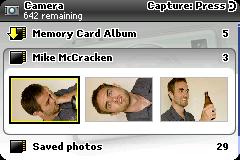Wednesday, 30 August 2006
Odds and ends
WWDC was fun, if exhausting; everything went wonderfuly smoothly (ignoring the traffic on 101 driving into SF on Friday night) until my flight home, when we were delayed four hours while United maintenance drove two bolts from SFO to SJC. Joy.
For some reason I didn’t get too much out of the WWDC sessions; perhaps I picked the wrong ones to attend. The small amount of time I spent in the labs made me wish I had hung out there more. I got to meet lots of people, both among my friends and the Mac developer crowd, and have some interesting conversations—although, as usual, even with thousands of people surrounding me from time to time I felt completely isolated.
I haven’t finished organizing photos and videos yet, mainly because I’ve been so busy since I returned, Lightroom really likes a faster machine than my iBook, and my iBook died over the weekend in any case. The photos I took at the large and enjoyable #macdev dinner are here, however.
There’s now a date and Web page with the papers for the OOPSLA 2006 Dynamic Languages Symposium in Portland in October, at which I’ll be presenting the work I did on a hardware transactional memory-enabled PyPy. Half the papers are Python-related, which is rather cool.
Finally, a couple of zsh tips. The great thing about a shell with as many features as zsh is that you never stop learning about new features and ways to use them. The annoying thing is that you seem to forget things just as quickly. Until this morning as I came across a mention in the zsh book (which I highly recommend), I’d used this idiom to get all the directories under the current one:
% print ./**(/) ./bin ./eio ./inputs ./outputs ./results ./src
But this excludes the current directory, which I often want (and usually forget) to include. Instead, you can do the following:
% print ./**/ ./ ./bin/ ./eio/ ./inputs/ ./outputs/ ./results/ ./src/
which, in addition to being shorter, has more DWIMitude.
This one is probably a bit better known, but I also discovered yesterday I can get a directory history list by typing ~- followed by the tab key. Reverse the sort order with ~+. Either way, it beats typing popd repeatedly to find the directory you want.
 11:20 AM
11:20 AM 3 Comments
3 Comments